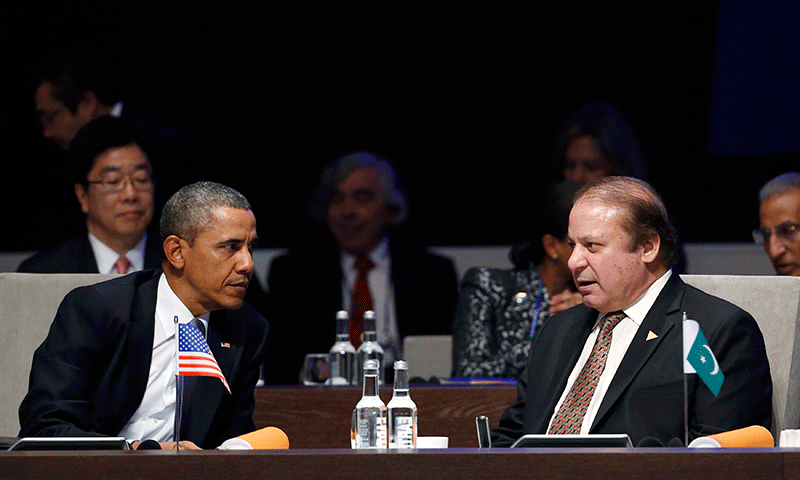THE HAGUE: Prime Minister Nawaz Sharif asked the US on Monday to play its role in normalising ties between Pakistan and India and said issues between the two neighbouring countries should be resolved.
Talking to reporters after a meeting with US Secretary of State John Kerry, he said India was hesitating to resolve the Kashmir issue bilaterally.
If India is not willing to include a third force in resolving the Kashmir issue then the United States will have to play its role in ensuring a normal situation in the region.
The prime minister said peace in Afghanistan was in the interest of Pakistan and the region.
He said Pakistan wanted to talk to the Afghan Peace Council to maintain peace in the region, adding that improved relations between Pakistan and Afghanistan should not be derailed.
The prime minister praised the US policy of discontinuing drone strikes in Pakistan and said this policy must be carried on.
During the meeting held on the sidelines of the two-day Nuclear Security Summit, Pakistan and the US reaffirmed their desire to continue their strategic dialogue, covering a wide range of areas.
The US secretary said his country had great confidence in Pakistan’s nuclear security and would continue to work with Pakistan in fighting terrorism.
In brief remarks to the media, he said the US would cooperate with Pakistan to help meet its energy needs.
Mr Kerry said the two countries were “deeply engaged” and would focus on the issues of terrorism and global energy, besides Afghanistan and the bilateral relations.
He said he was looking forward to his meeting with Finance Minister Ishaq Dar soon.
Prime Minister Sharif, in his speech at the Nuclear Security Summit, said Pakistan attached the highest importance to nuclear security because it was directly linked to the country’s national security.
He said: “Pakistan is a responsible nuclear weapons state and pursues a policy of nuclear restraint, as well as credible minimum deterrence.”
Leaders from 53 countries, the United Nations, European Union, International Atomic Energy Agency (IAEA) and Interpol are attending the summit.
“Our region needs peace and stability for economic development that benefits its people. That is why, I strongly advocate nuclear restraint, balance in conventional forces and ways to resolve conflicts,” the prime minister said.
Pakistan’s nuclear security is supported by five pillars -- a strong command and control system led by the National Command Authority, an integrated intelligence system, a rigorous regulatory regime, a comprehensive export control regime and active international cooperation.
Mr Sharif said the country’s security regime covered physical protection, material control and accounting, border controls and radiological emergencies.
He said Pakistan’s nuclear material, facilities and assets were safe and secure and the nuclear security regime was anchored in the principle of multi-layered defence against the entire spectrum of threats — from inside, outside or cyber threat.
He said the country had set up a centre of excellence that conducted intense specialised courses in nuclear security, physical protection and personnel reliability and was ready to share its best practices and training facilities with other interested states in the region and beyond.The prime minister said Pakistan had been running a safe, secure and safeguarded civil nuclear programme for more than 40 years and it had the expertise, manpower and infrastructure to produce civil nuclear energy.
“As prime minister, I feel that energy deficit is one of the most serious crises facing Pakistan. As we revive our economy, we look forward to international cooperation and assistance for nuclear energy under IAEA safeguards,” he said.
He called for Pakistan’s inclusion in all international export control regimes, especially the Nuclear Suppliers Group.
The prime minister said all leaders gathered at the meeting wanted nuclear security which was a national responsibility and a global priority. All countries should continue to take measures to secure all nuclear facilities and material and prevent any perceived nuclear terrorist threat.
“We all need radioactive sources for hospitals, industry and research; but should be vigilant about radiological threats,” he said.
He said Pakistan had deployed radiation detection mechanisms at several exit and entry points to prevent illicit trafficking of radioactive and nuclear material.
The prime minister announced that Pakistan was considering ratification of the 2005 Amendment to the CPPNM and was actively conducting a review to meet its various requirements.—APP















































